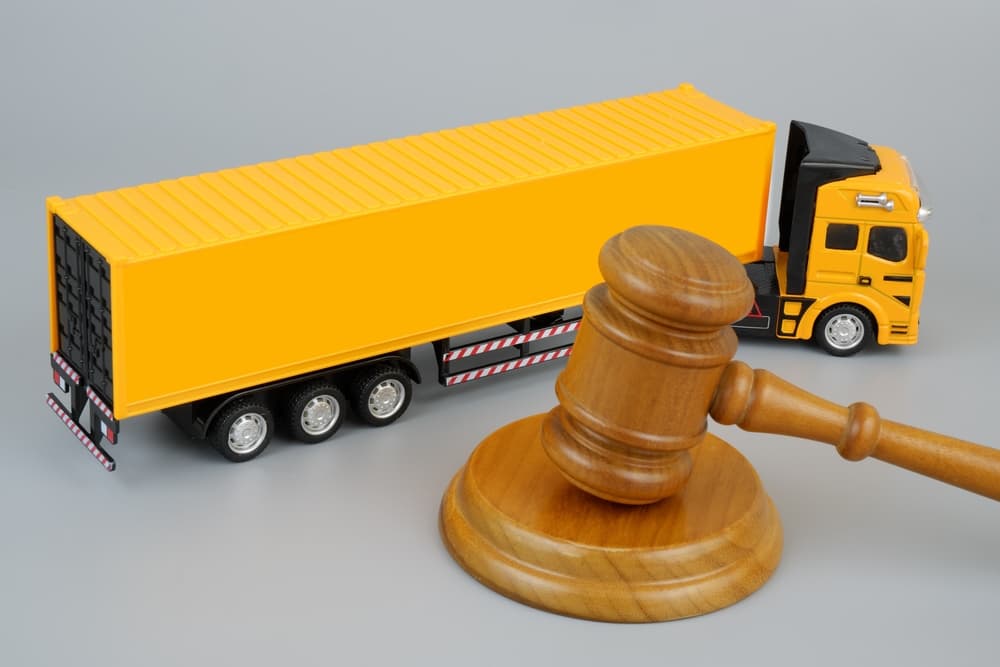Federal and state laws set the rules of the road for truck drivers and their companies. When those rules get ignored, liability shifts—and it’s not always where you’d expect.
If a truck accident upended your life, Holliday Karatinos Law Firm will help you figure out your next step. Call us at (352) 597-0009 to talk with a truck accident attorney who knows how to hold trucking companies accountable.
Federal and State Regulations Governing Trucking in Florida
Trucking regulations are everywhere—buried in federal statutes, spelled out by state agencies—and they form the backbone of every accident claim involving a commercial truck.
Federal Motor Carrier Safety Administration (FMCSA) Regulations
The FMCSA sets the national baseline for how commercial trucking companies should operate. These aren’t suggestions. They’re federal mandates enforced across the country, including right here in Florida. Some of the key areas the FMCSA regulates include:
- Hours of Service (HOS): Limits on how long a driver can be behind the wheel before they’re legally required to stop and rest. Federal law caps most commercial truck drivers at 11 hours of driving after 10 consecutive hours off duty (49 CFR § 395.3).
- Driver Qualifications: To hold a Commercial Driver’s License (CDL), drivers must meet strict age, health, and training requirements (49 CFR § 383). This includes passing physical exams and background checks for substance abuse and criminal history.
- Vehicle Standards: Trucks must undergo regular maintenance and pass safety inspections. Federal rules under 49 CFR § 396 require systematic maintenance programs and annual inspections that cover brakes, tires, lights, and other safety systems.
- Substance Abuse Testing: Truck drivers are subject to rigorous testing protocols under 49 CFR § 382. This includes pre-employment testing, post-accident testing, and random tests throughout the year.
Florida Department of Transportation (FDOT) Regulations
Florida doesn’t leave enforcement to the feds. The Florida Department of Transportation (FDOT) takes those FMCSA rules and adds a few extra layers. Trucking companies that operate within state lines—whether they’re delivering oranges to Ocala or freight to Fort Lauderdale—must follow Chapter 316, Florida Statutes, otherwise known as the Florida Uniform Traffic Control Law.
- Size and Weight Limits: Florida enforces maximum weights and dimensions for commercial trucks under Fla. Stat. § 316.535. Trucks over 80,000 pounds need a special permit.
- Intrastate HOS Rules: Florida mirrors federal hours-of-service rules for intrastate drivers but applies them under Rule Chapter 14-90, Florida Administrative Code, for vehicles carrying passengers or hazardous materials.
- Insurance Requirements: Florida requires commercial trucks to carry specific minimum insurance coverage, often higher than personal vehicle limits. Under Fla. Stat. § 627.7415, minimum liability coverage can range from $50,000 to $300,000, depending on the vehicle weight and cargo.
These layers of regulation stack up fast. The state of Florida and the federal government both want to make sure trucks are operated safely and responsibly. When they aren’t, the fallout becomes a legal issue, not just a safety one. That’s where accident claims start to take shape.
Impact of Regulation Violations on Liability
Establishing Negligence
Negligence is the backbone of most personal injury claims. Under Florida law, proving negligence requires showing four elements: duty, breach, causation, and damages. Trucking regulations help cut through the noise. They establish the duty of care drivers and companies owe to everyone else on the road.
When a driver violates a regulation—say, they blow through their Hours of Service limits and cause a crash because they’re running on fumes—that rule breach acts as evidence of a breach of duty. This concept, known as negligence per se, means a plaintiff doesn’t need to prove the trucker was careless. The fact that they broke a safety law can be enough. Florida courts recognize negligence per se when a violation of a statute designed to protect people from the kind of harm that occurred leads to injury (deJesus v. Seaboard Coast Line Railroad Co., 281 So. 2d 198, Fla. 1973).
Vicarious Liability
Sometimes the driver isn’t the only one on the hook. Under the legal principle of respondeat superior, an employer is responsible for the actions of its employees when they’re working within the scope of their job. If a driver causes a crash while making deliveries for a trucking company, the company may face vicarious liability—even if it did nothing wrong itself.
But things get worse for the company when it plays fast and loose with its responsibilities. If the trucking company hired an unqualified driver, skipped drug testing, or ignored maintenance schedules, it steps out from behind the shield of vicarious liability and into the world of direct negligence. Florida law allows claims for negligent hiring, supervision, and retention when an employer fails to exercise reasonable care in putting competent people on the road (Malicki v. Doe, 814 So. 2d 347, Fla. 2002).
Comparative Fault Considerations
Florida follows a comparative fault system under Fla. Stat. § 768.81. If multiple parties share responsibility for a crash, each one pays a portion of the damages based on their percentage of fault. That includes truck drivers, their employers, and even other drivers on the road.
Here’s how it plays out:
- If a truck driver violated federal Hours of Service limits and caused a crash, they take on a big slice of the blame.
- If a trucking company failed to maintain its vehicles and a brake failure contributed to the collision, the company picks up another portion.
- And if another driver cut the truck off, forcing an emergency maneuver, they may bear some of the fault too.
Florida’s current modified comparative fault system bars recovery if a plaintiff is found more than 50% at fault. But as long as the trucking company or driver carries a larger share of blame, the injured person has a valid claim. Violations of trucking regulations make it easier to tilt the percentages in favor of the person filing the lawsuit.
Evidence Collection Pertinent to Regulation Compliance
When a truck wrecks on US-301 or the I-4 interchange, the damage speaks for itself. Twisted metal. Skid marks that stretch for yards. But none of that tells you why it happened—or who broke the rules. That’s where evidence comes in.
Driver Logs and Electronic Logging Devices (ELDs)
A tired truck driver is a dangerous truck driver. That’s why Hours of Service limits exist, and proving a violation hinges on driver logs. For years, these logs were written by hand. Not surprisingly, mistakes happened. Some were innocent. Others were deliberate.
Now, most commercial trucks use Electronic Logging Devices (ELDs). Federal law under 49 CFR § 395.8(a)(1)(i) requires ELDs in nearly all commercial vehicles. These devices track:
- Engine start and stop times
- Vehicle movement
- Miles driven
- Driving hours versus rest periods
ELDs don’t lie. If a driver exceeded their legal driving hours, the data is in there. A qualified personal injury lawyer subpoenaing ELD records might uncover clear violations, making it easier to establish negligence.
Maintenance Records
Brake failure. Tire blowouts. Steering system malfunctions. These problems shouldn’t happen if a truck gets proper maintenance. But when a trucking company cuts corners, maintenance records—or the lack of them—become key evidence.
Under 49 CFR § 396.3, every trucking company must keep a maintenance file on each vehicle it controls for 30 consecutive days or more. These records include:
- Inspection dates and reports
- Maintenance schedules and completed repairs
- Parts replaced
- Corrective actions after reported defects
If the brakes failed because they hadn’t been inspected for months, or the tires were worn past legal tread depth, those records prove it.
Driver Qualification Files
Hiring an unqualified driver is like handing the keys to a loaded weapon. Federal regulations under 49 CFR § 391.51 require trucking companies to maintain Driver Qualification Files (DQFs). These files include:
- A copy of the driver’s CDL
- Medical examiner’s certificate
- Road test certificate
- Annual review of driving record
- History of traffic violations and accidents
- Verification of previous employment
A missing or expired medical certificate means the driver wasn’t legally cleared to be behind the wheel. A bad driving history ignored by the trucking company opens the door to claims of negligent hiring. Reviewing these files reveal whether or not a company ignored red flags when putting a driver on the road.
Substance Abuse Test Results
Drug and alcohol testing isn’t a one-and-done process. Trucking companies are required by 49 CFR § 382.401 to keep detailed records of all substance abuse testing for each driver. These include:
- Pre-employment screening results
- Random drug and alcohol test results
- Post-accident test results
- Return-to-duty and follow-up test records after a positive result
A positive test after an accident will change the entire liability landscape. But even a failure to test when the law requires it—after a serious crash involving injury or death—can point to a regulatory violation. Florida law also mandates immediate post-accident testing under Fla. Stat. § 440.102, especially when injuries involve potential workers’ compensation claims.
Role of Legal Representation in Navigating Regulation-Influenced Claims
Attorneys who focus on trucking accidents know where to look, who to question, and what documents flip a case from maybe to absolutely.
Investigative Expertise
Lawyers move fast to:
- Demand preservation of evidence through spoliation letters, ensuring trucking companies can’t “accidentally” delete logs or misplace reports.
- Subpoena black box data and dashcam footage that show what really happened before impact.
- Dig into driver qualification files and employment histories to expose hiring practices that skirt federal law.
Florida’s Rules of Civil Procedure (Rule 1.350) give attorneys the power to demand documents and admissions in discovery. And when a trucking company delays or refuses, an aggressive legal team pushes for court orders to force compliance.
Negotiation Skills
Trucking companies and their insurers don’t roll over. They bring defense lawyers who argue the crash wasn’t their fault, the injuries weren’t that bad, and if anything happened, the blame falls elsewhere. Legal representation levels the field.
- Attorneys leverage evidence of regulation violations—like HOS breaches or failed maintenance—to strengthen settlement positions.
- They use expert witnesses, including accident reconstruction specialists and medical professionals, to counter lowball offers.
- Negotiations take into account Florida’s comparative fault system, ensuring any settlement accurately reflects the degree of liability.
An experienced attorney knows when to press for more and when an offer meets the standard of fair compensation. The goal isn’t a quick check. It’s a settlement that covers every loss.
Litigation Preparedness
Sometimes settlement talks hit a wall. When that happens, litigation isn’t a threat—it’s the next move. And trucking accident lawyers prepare from day one as if a trial is coming.
- They file lawsuits within Florida’s two-year statute of limitations for personal injury.
- They secure testimony through depositions, pinning down drivers, safety managers, and company executives on the record.
- They present violations of FMCSA and Florida trucking regulations as clear evidence of negligence to juries who expect commercial drivers to follow the law.
Courtroom experience matters. Trucking companies fight hard to avoid bad verdicts that set expensive precedents. Legal teams who know their way around both state and federal courtrooms take cases the distance when needed—without hesitation.
Hold Trucking Companies Accountable with Holliday Karatinos Law Firm
If a trucking company gambled with safety and left you dealing with the wreckage, you deserve to hold them accountable.
Our team at Holliday Karatinos Law Firm knows how to handle trucking cases and the regulations that come with them. Call (352) 597-0009 to talk with a personal injury attorney who’s ready to fight for you.












